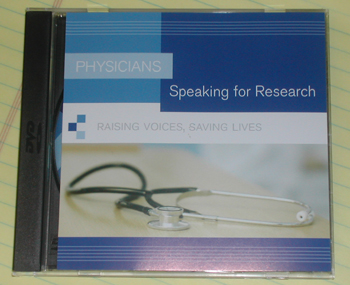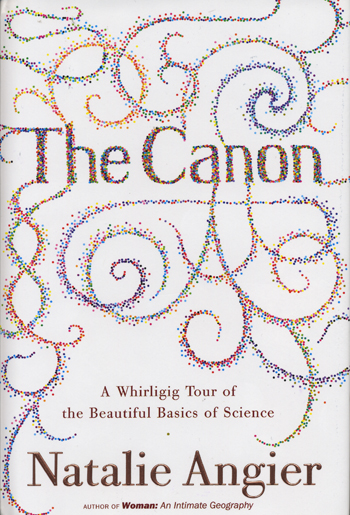This is a follow-up, of a sort, to the previous post on why serious discussions (as opposed to shouting matches or PR campaigns) about the use of animals in research seem to be so difficult to have. One of the contentious issues that keeps coming up in the comments is how (if at all) such discussions ought to deal with prior bad acts that may not be representative of what’s happened since, or even of the actions of most of the scientific community at the time of those prior bad acts.
My sense, however, is that the real issue is who we think we can engage in a serious reasoned dialogue with and who we’ve already written off, who we think is worth engaging because there’s really a shared commitment to take each other’s interests seriously, and who intends to “win” at any cost.
Category Archives: Communication
DVD review: Physicians – Speaking for Research.
 The other day I received a DVD made by Americans for Medical Progress called Physicians – Speaking for Research. (They indicate on their site that the DVDs are free for the asking.)
The other day I received a DVD made by Americans for Medical Progress called Physicians – Speaking for Research. (They indicate on their site that the DVDs are free for the asking.)
This is a DVD aimed at physicians, rather than at research scientists or the general public. However, the aim of the DVD is to help physicians to be better at communicating with the general public (primarily their patients, but also their family members and neighbors) about the role animal research has played in medical advances upon which we depend today, and the continued importance animal research will continue to play in medical progress.
In other words, this is a resource prepared with the awareness that groups like PETA have spent a lot of time communicating their message directly to the public, while scientists and physicians haven’t made much of an organized effort to communicate their views on animal research to the public, nor even to think hard about precisely what that message might be or how to communicate it most clearly to laypeople. The DVD puts communication (dare I say it, framing) front and center.
What are we *really* like? (Thoughts on meeting people you know from online in real life.)
In the aftermath of the ScienceBloggers’ assault on Manhattan, Mark Chu-Carroll put up a nice post on the ways in which bloggers’ real-life manner seemed to match or depart from their online personae.
Maybe philosophy’s to blame, but I think there’s a deep and interesting question here.
Passing thoughts about conference presentations.
As I mentioned in my last post, I was sucked out of the blogosphere for much of last week by the International Society for the Philosophy of Chemistry (ISPC) 2007 Summer Symposium .
I did not live-blog the conference. I did use overheads. Why, other than being a tremendous Luddite, would I use overheads?
Is a shift away from peer review cause for concern?
Today, Inside Higher Ed has an article about the recent decline of peer reviewed papers authored by professors in top five economics departments in high profile economics journals. A paper by MIT economics professor Glenn Ellison, “Is Peer Review in Decline?,” considers possible explanations for this decline, and the Inside Higher ed article looks at the possible impacts of this shift.
The alternative threatening the peer reviewed journals here is the web, since scholars can post their papers directly to their websites (or blogs) rather than letting them languish with pokey referees. But I think the issues here go beyond the tug-of-war between old media and new media and bring us to the larger question of just what is involved in building new scientific* knowledge.
Book review: The Canon.

The average American’s lack of scientific literacy has become a common complaint, not only among scientists but also among those who see our economic prospects as a nation linked to our level of scientific know-how. Yet somehow, science has become an area of learning where it’s socially acceptable to plead ignorance. Adults leave the house without even a cocktail-party grasp of the basics they presumably learned in middle school and high school science classes, and the prospects of herding them back into a science classroom to give it another go seem pretty remote.
Natalie Angier’s new book The Canon seeks to provide an audience of adults with the central ideas in physics, chemistry, biology, geology, and astronomy, as well as a reasonable handle on the activity of science more generally. Angier is not presenting a textbook for a survey course, but rather a taste of how these different scientific disciplines understand various chunks of the world we live in. The audience she is trying to reach may fear science, or remember it as boring, or have no good story about how it connects with everyday life. Angier is relentless in identifying science as it crosses our paths, and it is clear that she is taken with the beauty in the scientists’ accounts of their phenomena. What is less clear is whether Angier’s rhapsody to science will really engage her intended audience.
Why does Medawar hate the scientific paper?
Following up on the earlier discussions of intentional unclarity and bad writing in scientific papers, I thought this might be a good opportunity to consider an oft-cited article on scientific papers, P.B. Medawar’s “Is the Scientific Paper Fraudulent?” [1] He answers that question in the affirmative only three paragraphs in:
The scientific paper in its orthodox form does embody a totally mistaken conception, even a travesty, of the nature of scientific thought.
Does thinking like a scientist lead to bad science writing?
In his book A Short Guide to Writing About Science [1], David Porush suggests that the mindset useful for doing science isn’t always the best mindset for communicating science. (It’s more than a suggestion, actually — the second chapter of the book is titled “Why Good Scientific Thinking Can Lead to Bad Science Writing.”) Since it’s connected to our prior discussion of ambiguous scientific writing, let’s have a look at Porush’s diagnosis of bad science writing and the ways he thinks it could be better.
OpenWetWare
Regular readers know I frequently suggest the community of science would be better off if its institutional contexts favored more collaboration and less competition. (I’m not the only one.) So I wanted to mention a project, OpenWetWare that’s trying to move biology in that direction.
Clarity and obfuscation in scientific papers.
Those of you who have ever brought a piece of scientific research to completion — a process which almost always includes publishing your results — have probably run into lists like this one that spell out the meanings of phrases commonly used in scientific papers. Included are such classics as:
